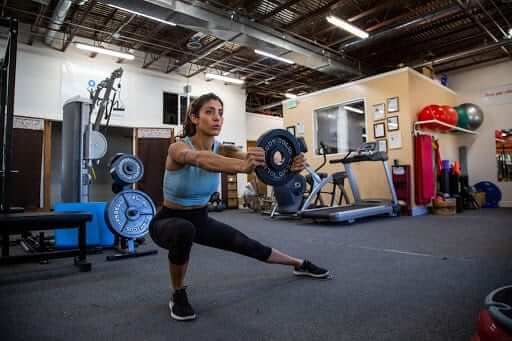Joslynn Peterson’s impression of a dead bug is spot-on. A lower back stretch that she practices with her clients while working as a strength trainer; the move resembles a deceased bug with all appendages pointing toward the sky. We could all benefit from becoming dead bugs. Jos is a strength coach, but she’s also a rock climber, surfer, runner, hiker, and overall badass. Her Instagram account is packed with training tips, stretches, a demo of the “dead bug,” and videos of her crushing boulder problems. But on the first day of each month, her Instagram post looks a lot different. Using the hashtag #feelitonthefirst, she posts a reminder to check for breast cancer—a preventative measure to scan for the second most common cancer among women in the US.
Jos had a prophylactic double mastectomy in 2018, removing her breasts. Her grandmother passed away from breast cancer at the age of 35. During a routine check-up, Jos mentioned this to her doctor. Together, they decided she should head for genetic testing to see if she was carrying a gene mutation that would put her in a high-risk category for developing breast cancer herself. She was. This put her chances of facing breast cancer at about 72 percent. Jos recalls it as being a straightforward choice. She was having preventative surgery—a double mastectomy. And then she was having breast reconstruction surgery.

Jos has always been an advocate for prevention, even before her surgery. Her work as a strength trainer is focused on diminishing the chance of injury. “I tried to really do a holistic approach. I believe that with sports, especially competition sports, people are going to continue to do better at their sport if they don’t get injured—if you’re treating your body correctly and getting all the different pieces together.”
And Jos feels we all have a lot of pieces that need to fit together to be the best version possible. One piece of this equation is nutrition. Without it, the body isn’t supported properly. Her holistic approach to being the best version of herself has many components. “Even through a surgery or a life-changing event, if you push yourself and can look in the mirror and ask, ‘Am I doing my best?’ you will just continue to do better.”
What else fits in this puzzle of attaining greatness? Rest. But stopping may seem like the exact opposite of what would make you a better and stronger athlete. For Jos, rest is a key component in injury prevention. “Rest goes into the mental cost of wanting to push yourself but also allowing for the necessary space to recover. You also need de-load weeks to have your brain settle. Burnouts are a real thing, and I think many athletes just go go go. I see it all the time.”

Oftentimes, it’s precisely the lack of rest and recovery that is holding you back. Imagine you constructed a craft project and used an entire bottle of glue. You pick it up before the glue dries and the project falls apart, glue dripping off. The art project is your body. You invested in it, worked hard on it, put some glitter on it, and sometimes the best thing you can do to help it flourish is to leave it alone for a bit.

Jos’ maiden name, Corredor, means “runner” in Spanish. Fittingly, Jos ran for Oregon State University, a Division 1 school in the NCAA ranking. When her life as a competitive runner ended, she moved to Boulder, Colorado and was introduced to rock climbing. Now it’s something she can’t envision her life without. This made her mastectomy and reconstruction surgery all the more difficult, given that climbing relies heavily on chest muscles, the exact muscles her body was working to recover after surgery. While she’ll never forget the experience, she says she often forgets she has foreign objects in her body.
Prevention, to Jos, is the best way you can give back to your body. In her own life, this looks like working on intentional strength gain, fueling her body right, training athletes in ways that will help them avoid injury, and resting. Prevention has sometimes been intense in Jos’ life, taking years to fully recover from the mastectomy. She’s now the resource she wishes she had access to while she was going through the process of understanding what her gene mutation meant. She’s now a ‘previvor’, one who removed a predisposition to cancer, and now she is running at full speed into a strong future.







